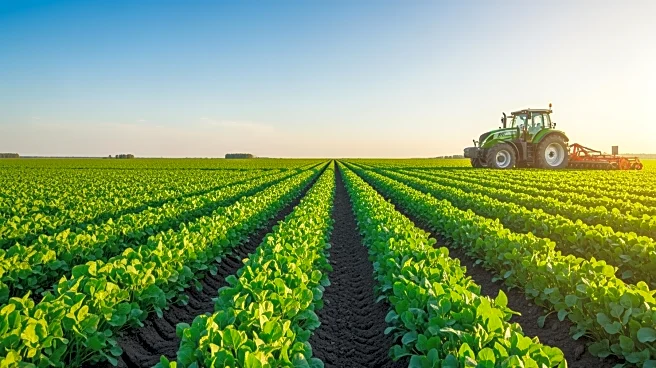What's Happening?
The Brazilian agricultural sector is gearing up for a significant transformation as new tax reform rules are set to take effect in January 2026. These changes will alter the way registration, tax issuance, and taxation are handled in the field. The Confederation
of Agriculture and Livestock of Brazil (CNA) is actively guiding producers through this transition, emphasizing the importance of adapting to the new system. The reform aims to modernize the national tax system, reduce bureaucracy, and enhance integration between producers and state governments. Key changes include the end of state registration, adoption of the alphanumeric CNPJ, and the introduction of the Subscription and Authorization Provider (PAA) for validating electronic tax documents. The CNA is advocating for a gradual transition to ensure that the tax burden does not increase and that the essential role of agriculture in food security is recognized.
Why It's Important?
This tax reform is crucial for the Brazilian agricultural sector as it promises to streamline operations, reduce bureaucratic hurdles, and improve transparency in tax management. By centralizing tax registries and simplifying the invoicing process, the reform aims to enhance efficiency and foster a more integrated tax environment. The changes are expected to benefit rural producers by making tax compliance easier and more accessible, particularly for those operating far from urban centers. The reform also underscores the importance of agriculture in Brazil's economy, ensuring that the sector continues to play a vital role in food security. However, the success of this transition will depend on the sector's ability to adapt to the new rules and the cooperation between government and producers.
What's Next?
The transition phase will allow producers to issue Electronic Tax Documents using state registration linked to the CPF until January 1, 2027. The CNA and state finance departments are working together to ensure a smooth transition, with a focus on dialogue and efficient implementation. The mandatory use of Unified CNPJ and standardized electronic invoices is set to be consolidated by 2027. Producers are encouraged to organize and plan for short, medium, and long-term actions to adapt to the new fiscal management paradigm. The gradual integration of the Simplified Invoice (NFF) system across all states is expected to be completed by the end of 2026, further facilitating the digitalization and transparency of agricultural transactions.
Beyond the Headlines
The tax reform represents a new paradigm of fiscal management and citizenship, aiming to simplify the tax system and enhance transparency in rural operations. The creation of the Subscription and Authorization Provider (PAA) is expected to reduce infrastructure costs and increase fiscal security, providing greater access control and immediate notification to tax authorities in case of misuse. The reform is a collaborative effort between the government and producers, focusing on efficient implementation and continuous monitoring. As the sector adapts to these changes, it will be better equipped to face the challenges of modernizing tax management and ensuring food security in Brazil.















